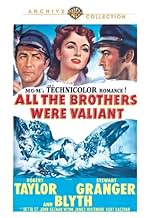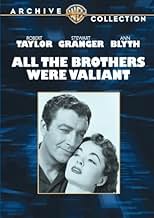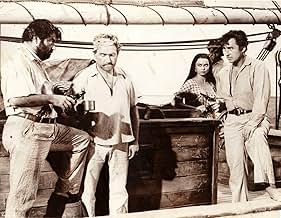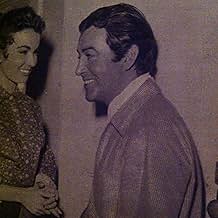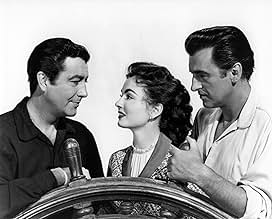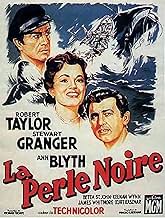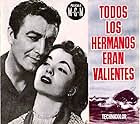VALUTAZIONE IMDb
6,2/10
1174
LA TUA VALUTAZIONE
Aggiungi una trama nella tua linguaIn the South Pacific islands, two brothers, one good and one bad, fight over the same girl and over a bag of pearls.In the South Pacific islands, two brothers, one good and one bad, fight over the same girl and over a bag of pearls.In the South Pacific islands, two brothers, one good and one bad, fight over the same girl and over a bag of pearls.
- Regia
- Sceneggiatura
- Star
- Candidato a 1 Oscar
- 1 candidatura in totale
Frank DeKova
- Stevenson
- (as Frank deKova)
Recensioni in evidenza
Taylor is captain of a whaling ship in the south Pacific. His wife, Anne Blythe, is also aboard to keep Taylor from getting too nervous. The crew are a mixed lot. Somewhere along the way Taylor's ship picks up Taylor's brother, Stewart Granger, who left home long ago to pursue various unsavory adventures, leaving behind a history of family friction.
Granger relates a tale of falling in with a couple of douche bags, Kurt Kaszner and James Whitmore, who show him a stash of pearls in the lagoon of an island inhabited by hostile natives. Before they can make off with the millions of dollars of rare pearls, the two miscreants are killed and Granger barely escapes alive.
Back aboard Taylor's ship, Granger invites him to forget about any past frictions and join him in getting the pearls. Forget the whaling business. It sounds pretty good to Anne Blythe, who has always had a bit of a crush on the roguish Granger, but Taylor's face is grim as he declares that he, the captain, will carry out the ship's mission, which is to kill whales.
Stewart seduces Blythe and incites a mutiny. That's the kind of guy he is. There is a knockabout fist fight, and Granger changes sides to fight side by side with his brother and -- well, medical discretion forbids the revelation of additional plot details, but, this being a 1950s movie, you can guess the ending.
Interesting to see Stewart Granger in the role of irresponsible and light-hearted adventurer, kind of an Errol Flynn role. Robert Taylor's acting makes a quantum leap in this film -- he manages to suggest two emotions at the same time. As an actress, Anne Blythe had a pretty voice.
The score is by Miklos Rozsa. You can tell from the moment that first signature six-note phrase appears. We're told Rozsa was a musical prodigy. There's no reason to doubt it, but he recycled the same tone and even the same melodies from one movie to the next. Dmitri Tiomkin was also distinctive, but you can tell one score from another. "The Guns of Navarron" doesn't sound like "Red River." But here, if you close your eyelids, you find you're watching "Ben Hur" unroll on their interiors.
I hate to sound too sarcastic about this but it really is a dated by-product of the old Hollywood. It seems to have been ground out like a Sonic Burger. Everyone wears clean clothes. The men are closely shaved except those who look like supporting players and extras who have been instructed to grow beards so they look villainous. The tans are not from the weather but from Max Factor. After a monstrous gut-busting fist fight, nobody has a mark on him -- and this was after "Shane". The scenes aboard ship are studio bound. There's not a puff of wind.
Strictly routine.
Granger relates a tale of falling in with a couple of douche bags, Kurt Kaszner and James Whitmore, who show him a stash of pearls in the lagoon of an island inhabited by hostile natives. Before they can make off with the millions of dollars of rare pearls, the two miscreants are killed and Granger barely escapes alive.
Back aboard Taylor's ship, Granger invites him to forget about any past frictions and join him in getting the pearls. Forget the whaling business. It sounds pretty good to Anne Blythe, who has always had a bit of a crush on the roguish Granger, but Taylor's face is grim as he declares that he, the captain, will carry out the ship's mission, which is to kill whales.
Stewart seduces Blythe and incites a mutiny. That's the kind of guy he is. There is a knockabout fist fight, and Granger changes sides to fight side by side with his brother and -- well, medical discretion forbids the revelation of additional plot details, but, this being a 1950s movie, you can guess the ending.
Interesting to see Stewart Granger in the role of irresponsible and light-hearted adventurer, kind of an Errol Flynn role. Robert Taylor's acting makes a quantum leap in this film -- he manages to suggest two emotions at the same time. As an actress, Anne Blythe had a pretty voice.
The score is by Miklos Rozsa. You can tell from the moment that first signature six-note phrase appears. We're told Rozsa was a musical prodigy. There's no reason to doubt it, but he recycled the same tone and even the same melodies from one movie to the next. Dmitri Tiomkin was also distinctive, but you can tell one score from another. "The Guns of Navarron" doesn't sound like "Red River." But here, if you close your eyelids, you find you're watching "Ben Hur" unroll on their interiors.
I hate to sound too sarcastic about this but it really is a dated by-product of the old Hollywood. It seems to have been ground out like a Sonic Burger. Everyone wears clean clothes. The men are closely shaved except those who look like supporting players and extras who have been instructed to grow beards so they look villainous. The tans are not from the weather but from Max Factor. After a monstrous gut-busting fist fight, nobody has a mark on him -- and this was after "Shane". The scenes aboard ship are studio bound. There's not a puff of wind.
Strictly routine.
Another commenter mentioned the un-likelihood of a whaler captain taking his bride on a projected three-year voyage.
In fact, sailors, a generally superstitious lot, often found women on a ship to be a jinx.
Then, too, today the very act of whaling is so P non-C that a lot of people will object to that aspect, rather than concentrating on the fact the story is set at a time no one saw a particular problem with killing the sea-going mammals for their oil.
Robert Taylor gives one of his best performances; Stewart Granger comes across very well.
Ann Blyth has some good scenes, and some bad ones, but she does them all well.
One really attractive aspect of "All the Brothers" is a superb supporting cast. Peter Whitney, for example, has one of his best roles in a very long career. He too often plays a dumb or bumbling character, but here he is a strong person in a pivotal position.
Leo Gordon has a smaller role, but he stands out, as does John Lupton, in a larger part.
Frank DeKova (whom I met on the set of "Johnny Firecloud") was a superb character actor but who was too often relegated to small roles. He could have been a bigger star, with his talent, but he was recognized by his peers, anyway.
The great Glenn Strange and the great John Doucette were aboard, adding their enormous talents and, as so often true in Hollywood, not getting screen credit.
Come to think of it, this movie is worth watching just for the great cast. But be prepared to suspend your disbelief, and don't look at the blue eyes of the "native girl."
In fact, sailors, a generally superstitious lot, often found women on a ship to be a jinx.
Then, too, today the very act of whaling is so P non-C that a lot of people will object to that aspect, rather than concentrating on the fact the story is set at a time no one saw a particular problem with killing the sea-going mammals for their oil.
Robert Taylor gives one of his best performances; Stewart Granger comes across very well.
Ann Blyth has some good scenes, and some bad ones, but she does them all well.
One really attractive aspect of "All the Brothers" is a superb supporting cast. Peter Whitney, for example, has one of his best roles in a very long career. He too often plays a dumb or bumbling character, but here he is a strong person in a pivotal position.
Leo Gordon has a smaller role, but he stands out, as does John Lupton, in a larger part.
Frank DeKova (whom I met on the set of "Johnny Firecloud") was a superb character actor but who was too often relegated to small roles. He could have been a bigger star, with his talent, but he was recognized by his peers, anyway.
The great Glenn Strange and the great John Doucette were aboard, adding their enormous talents and, as so often true in Hollywood, not getting screen credit.
Come to think of it, this movie is worth watching just for the great cast. But be prepared to suspend your disbelief, and don't look at the blue eyes of the "native girl."
I have seen this movie several times and discover something new every time. One of the best things about this movie is the flashback sequence with Granger fighting pirates Whitmore and Kasznar for a bag of pearls. The rest of the movie explains how he tries to get his brother [Taylor] to them back from the lagoon where they were lost. You will need to see this movie at least two times before you understand all of the hidden plot twists.
This swashbuckling yarn pits Robert Taylor and Stewart Granger against each other as brothers who have very different ideas about how to captain a ship. There's mutiny, island lasses, palm trees, and lots of that flat, too-bright lighting common to Technicolor films from the 1950s. George Folsey received his billionth Oscar nomination for the film's color cinematography, but I'm guessing it was more for capturing some pretty ocean scenery than it was any artistic decisions.
Ann Blyth gives a sub-par performance as Taylor's wife who comes along for the sea voyage. She's a boring character and her presence teeters the film too often into romantic melodrama, when what we really want is more macho battle of wills.
Grade: B-
Ann Blyth gives a sub-par performance as Taylor's wife who comes along for the sea voyage. She's a boring character and her presence teeters the film too often into romantic melodrama, when what we really want is more macho battle of wills.
Grade: B-
This film is an adaptation of a novel. I have not read it, but it seems like a story of big action and big themes. It can be difficult to put such a story on film, but the filmmakers did a decent job of it.
It all begins when whaling captain Joel Shore returns home to New Bedford, after a lengthy expedition. He finds that Priscilla Holt (Ann Blyth) has grown into young womanhood, and he asks her to marry him before he takes to the sea again. She agrees, despite the fact that Joel might be gone for two or three years. He surprises her by refitting the captain's quarters of the Nathan Ross so that she can go with him. And they set to sea, where she learns about whaling and the dangers of sea life. Everything changes when they discover that Joel's older brother, Mark (Stewart Granger), who used to captain the Nathan Ross, is alive.
Much of the film consists of flashbacks of Mark's story. And then it picks up with Joel, Mark, and Priscilla back on the water, where complicated passions and differing purposes are dealt with. The ninety-five minutes of running time are filled to the brim with conflict and adventure, including a fight scene that is very worthy of the genre.
The acting, across the board, is good. Granger has the meatiest part, and he takes advantage of it. Watch for Lewis Stone in his last film appearance. And Keenan Wynn and James Whitmore, who tackle musical comedy in "Kiss Me Kate", soon after their appearance here.
It all begins when whaling captain Joel Shore returns home to New Bedford, after a lengthy expedition. He finds that Priscilla Holt (Ann Blyth) has grown into young womanhood, and he asks her to marry him before he takes to the sea again. She agrees, despite the fact that Joel might be gone for two or three years. He surprises her by refitting the captain's quarters of the Nathan Ross so that she can go with him. And they set to sea, where she learns about whaling and the dangers of sea life. Everything changes when they discover that Joel's older brother, Mark (Stewart Granger), who used to captain the Nathan Ross, is alive.
Much of the film consists of flashbacks of Mark's story. And then it picks up with Joel, Mark, and Priscilla back on the water, where complicated passions and differing purposes are dealt with. The ninety-five minutes of running time are filled to the brim with conflict and adventure, including a fight scene that is very worthy of the genre.
The acting, across the board, is good. Granger has the meatiest part, and he takes advantage of it. Watch for Lewis Stone in his last film appearance. And Keenan Wynn and James Whitmore, who tackle musical comedy in "Kiss Me Kate", soon after their appearance here.
Lo sapevi?
- QuizFinal film of Lewis Stone (Capt. Holt), who died in September 1953, two months before the film was theatrically released.
- BlooperWomen aboard ship were considered bad luck all through the sailing ship days. The superstition even extended part way into the modern era. Crews were known to resist sailing on ship that was to have a woman aboard.
- ConnessioniRemake of Amore e mare (1928)
I più visti
Accedi per valutare e creare un elenco di titoli salvati per ottenere consigli personalizzati
- How long is All the Brothers Were Valiant?Powered by Alexa
Dettagli
- Data di uscita
- Paese di origine
- Lingua
- Celebre anche come
- All the Brothers Were Valiant
- Luoghi delle riprese
- Azienda produttrice
- Vedi altri crediti dell’azienda su IMDbPro
Botteghino
- Budget
- 1.816.000 USD (previsto)
- Lordo in tutto il mondo
- 8168 USD
- Tempo di esecuzione
- 1h 35min(95 min)
Contribuisci a questa pagina
Suggerisci una modifica o aggiungi i contenuti mancanti


